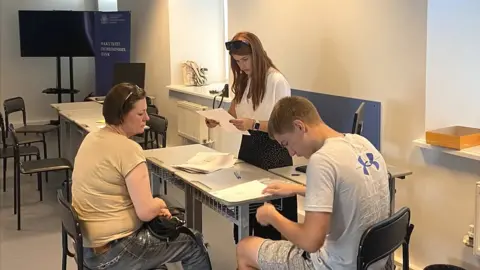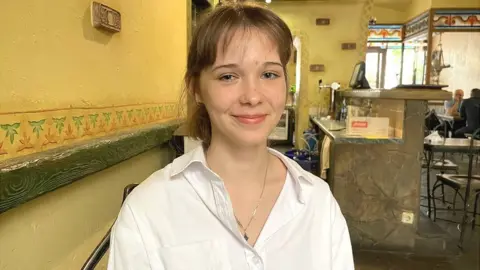Ukraine war: University students grapple with rules under conflict
 BBC/Svitlana Libet
BBC/Svitlana LibetUkraine's students are getting used to disruption.
Outside Kyiv-Mohyla Academy, a university here in the country's capital, a group of student volunteers are helping new applicants to enrol.
Anna explains that some of the current students have never attended a class here in person.
"They were accepted during the Covid [pandemic], and then Russia's full-scale invasion happened, so they were never really in class offline. It's a little bit sad."
But she and her fellow volunteers explain that things are different now, with students returning to in-person lectures this year, despite the ongoing war.
That means parents have even more questions than usual.
"They ask pretty often if we have enough places in shelters if [their children] come and study here," Anna says.

And it also means even further pressure on students deciding whether and where to go to university.
Under war-time government rules, no man aged between 18 and 60 can leave Ukraine without special permission from the authorities.
That means male students who decide to study in Ukraine cannot travel abroad until the war is over. And while currently students are exempt from being drafted into the army, those rules could change if Ukraine suddenly needs more men.
It also means male students thinking of studying abroad have to leave before they turn 18: crucially, they are unable to return home to visit without then risking getting stuck inside their own borders.
Russia's war is opening a gender divide in Ukrainian society.
Liza fled west when Russia launched its assault on Ukraine last year, and settled eventually in Germany.
She's now planning to study sciences in the southern city of Konstanz there, on the border with Switzerland, after she's passed a mandatory German language course.
The 17-year-old has returned home briefly to Kyiv to prepare for university.
"I'm relying on the chance to buy something in Germany because they've got more shops open - many shops I liked in Kyiv closed," she says. "But it's more expensive there. So I'll thrift in Kyiv before I go!"

Liza says that of her 32 classmates at school in Ukraine, half have chosen to study abroad - both boys and girls. She says the male students in her year have accepted the rules.
"It's not even discussed. Boys don't blame anyone, they understand it's the rules and they should be obeyed," she says. "But they try also to leave - they're [just] 16, 17, 18 years old."
Misha, 17, struggled this year to decide where to apply.
"You have a lot more opportunities [elsewhere] in Europe," he says. "You have a lot more nightlife. For a 17-year-old guy like me, I want to have some crazy stuff going on - I know in Kyiv the only thing I can do after midnight is stay at home, because of the curfew."
But ultimately he realised he couldn't leave his family and his friends.
"My parents were pressuring me so hard to go somewhere because I might get drafted into the army, I might get killed by a rocket," he says. "But I'm not afraid. Maybe it's my mistake, but I don't care, that's how I want to live."
Misha says he also wants to stay in Ukraine to focus on his plans for the future, and to help rebuild the country. He makes electronic music under the name "shlepok", meaning "slap" in Ukrainian, and wants to keep growing his presence here in Kyiv.
"I'm very optimistic about Ukraine," he says. "With people like me and my friends... I think we can make Ukraine great."
He's not alone. Stephan is also a 17-year-old student, based here in Kyiv. Unlike Misha, he applied and was accepted to a university in Poland.
But instead of leaving his country, he's decided to study remotely from Ukraine, and has signed up for additional courses with universities at home.
"My parents wanted me to go to Poland," he says. "I wanted to stay in Ukraine."
Stephan is not just studying - he is working as the creative director of a marketing agency called Hooligan Bureau. He walks us around the 24th floor of a building near Kyiv's Polytechnic Institute where they're making an office for clients.
He thinks there's no time to waste to develop his country.

"The war will end soon, and we'll need to rebuild Ukraine," Stephan says. "Everything is dependent on [individual] Ukrainians. We are a strong nation, and we can make everything happen."
Before the war, Stephan says travel was important to him - he's been across Europe, to the US, even to some parts of Asia. He says he's happy in Ukraine for now. Once the war is over though, he has plans to travel again.
"I'd like to visit all the countries that had helped Ukraine most," he says. "I want to create a project, 'A thank you for countries', with nations that have supported Ukraine, like the UK and lots of countries in the EU."
That would be his second trip though. "I want to go to Russia and hit everyone in the face!" he jokes.
Additional reporting by Svitlana Libet
